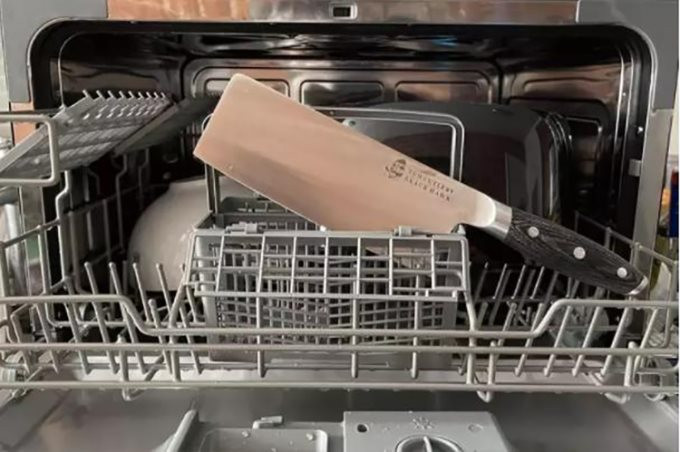Proper cleaning will limit rust on the knife surface, protecting the health of your family when using it.

Whether you are a seasoned chef or an ordinary housewife, a good knife will make the cooking process easier. However, after slicing, peeling, chopping... if you do not know how to clean and preserve it, the knife will quickly rust and become damaged.
Here are three knife cleaning mistakes that many people make.
Dishwasher safe
Even if the manufacturer notes that the knife is dishwasher safe, it's best not to clean it that way.
Dishwashers often use high temperatures, detergents and strong water pressure, which can damage the blades and handles. In addition, the strong impact of the machine during washing will cause the blades to chip, loosen the handles and affect the surrounding utensils. The temperature and humidity in the machine can also damage the wooden knife handles.
Washing your knife by hand under running water is the safest and most effective way to clean and maintain the quality of your tools. At the same time, keeping your knife clean and shiny ensures sharpness and prolongs its life.
Soak in the sink after use
One of the first lessons of professional chefs is not to soak knives in the sink. This partly ensures safety for the user who accidentally gets cut by the blade, but also because knives soaked in soapy water will quickly deteriorate.
To ensure safety when cleaning knives, follow these steps:
- To avoid cutting yourself by touching the blade, wash the knife from back to front, always keeping the sharp part of the knife facing out when cleaning with a sponge.
- You should clean the knife with dishwashing liquid or mild detergents to keep the knife looking new and beautiful and to prevent the surface from becoming dull.
- After cleaning, store the knife on the rack in a completely dry condition.
Do not dry the knife after cleaning.
Exposure to water or prolonged soaking can cause the knife handle to swell, warp or crack. In addition, knives made of iron and steel often develop rust stains, which is due to the corrosive effect of this substance when reacting with water and oxygen. After cleaning, the knife should be dried with a dry cloth, ensuring that there is no water left on the blade or handle. In addition, it should be stored in a dry place, away from moisture.
Rice water also has antibacterial and anti-rust effects. Therefore, rice water can be used to clean knives after use, helping to keep the knife shiny and minimizing the appearance of rust stains.